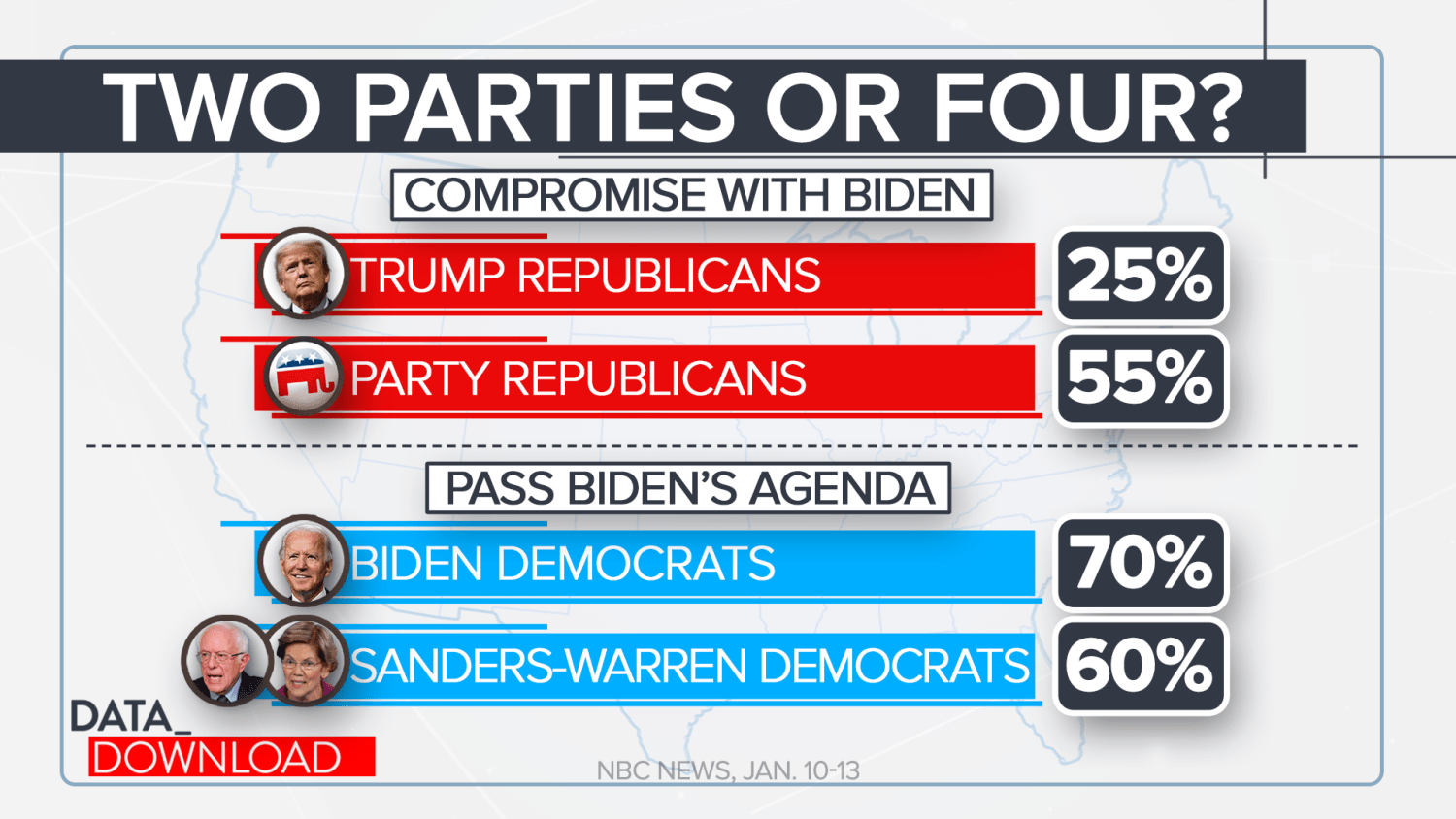[ad_1]

WASHINGTON — A new president, a new Congress, and the same partisan divide, right? Already the familiar laments about the red/blue split in Washington have started, and there are many signs those left/right differences are still alive and well. But as both parties deal with internal tensions, that simple binary color code might miss some important nuances in 2021’s politics.
The latest NBC News poll shows that both the Democratic and Republican parties have clear divides within themselves as well, and that could have real meaning in the months ahead on a range of issues.
On the surface the partisan identification numbers look very familiar.
About 4 in 10 registered voters identify as Democrats or lean Democratic. A smaller number identify as Republicans or lean Republican. The remainder are what we call hard independents or simply don’t care to answer.
But dig into those two partisan groups a bit and the numbers change. In fact, four “parties” emerge in the data.
About 17 percent of those surveyed say they are Republicans who consider themselves to be mostly supporters of former President Donald Trump. Another 17 percent would characterize themselves as Republicans who are more supporters of the Republican Party.
And the numbers look familiar on the other side.
About 17 percent of those surveyed say they are Democrats who were supporters of President Joe Biden in the primaries. And another 17 percent of respondents say they are Democrats who were supporters of the further left-leaning candidates, Massachusetts Sen. Elizabeth Warren or Vermont Sen. Bernie Sanders.
Yes, you read that right. Those are 17’s across the board — all even. Of course, those numbers aren’t hard and fast. A different poll would probably find slight variances in the groups. And all together those numbers still leave about a third of the registered voters in the survey without a camp.
Still, there are clearly some real divides within the parties and other questions in the poll suggest they might have meaning in the year ahead.
Consider the way the two groups view the leaders of their respective parties at the moment.
The 17 percent of the poll that is made up of Trump Republicans doesn’t just like the former president, they are extremely enthusiastic about him: 99 percent of them give him a positive personal rating and 87 percent of that is “very positive.” To be clear, that is not a job performance rating; that is a measure of whether they have positive feelings about him personally.
Among the party Republicans, the number is still high, but a bit lower and not so solid. The “positive feelings” number drops more than 20 points to 78 percent and only 44 percent of that group is “very positive” about Trump.
For the Democrats, Biden has a similarly strong hold over his part of the party. A full 93 percent of Biden Democrats say they have positive feelings about the president, and 74 percent are “very positive.”
Among Warren/Sanders Democrats, the number drops. Just over 75 percent say they have positive feelings about Biden and only 27 percent say they have “very positive” feelings about the president.
There is considerable daylight between each of the Democratic and Republican groups. And those attitudes could shift over time as Trump’s post-presidency and Biden’s Democratic honeymoon periods wear off. Each party could find itself with some strong internal disagreements.
The fault lines between the segments become even more pronounced when you look at policy.
With Joe Biden in White House now and Democrats in control of the House and Senate, the question is where each of these four groups stands on a Biden agenda. There are disagreements.
Among Republicans, the Trump part of the party is firmly against compromising with Biden in order gain consensus on legislation. Only 25 percent of the Trump Republicans favor that approach.
But party Republicans feel very differently. More than half, 55 percent, favor making compromises with Biden to gain consensus on legislation.
On the Democratic side there are also splits: 7 in 10 Biden Democrats want the congressional Democrats to work to pass the Biden agenda, while 20 percent of that group would rather “hold the line” for more progressive policies.
But among Sanders/Warren Democrats, the support for passing the Biden agenda falls to 60 percent, with about 30 percent favoring an approach that holds the line for more progressive policies.
Those are figures that at least suggest there could be some surprises in Congress in the coming months. They are not numbers that scream party discipline for either side.
Again, these data are from one poll that came during a very tumultuous moment. It was conducted from Jan. 10-13, just after the Capitol riot and before Biden’s inauguration.
But these splits are nothing new; they reflect divisions in the parties we have been tracking for years now. And the fact that these splits are this even and this clear as a new administration and Congress checks in may be telling. For all the social media chatter about a “civil war” brewing in America, these figures suggest the real story in coming weeks may be intra-party conflict.
[ad_2]
Source link